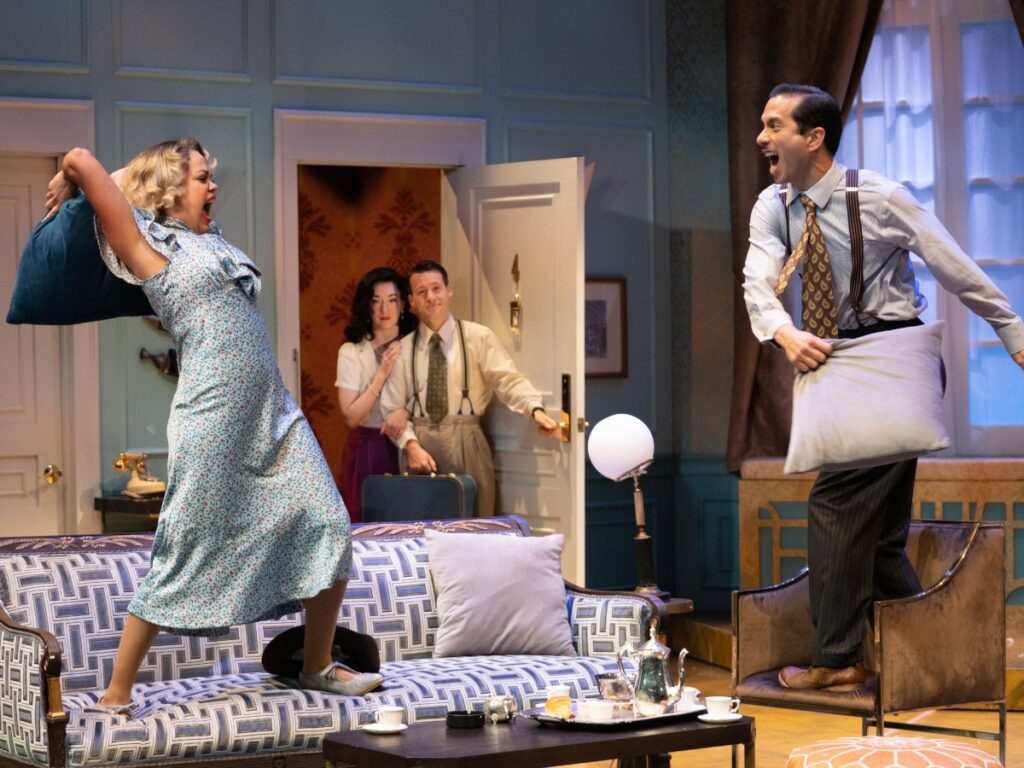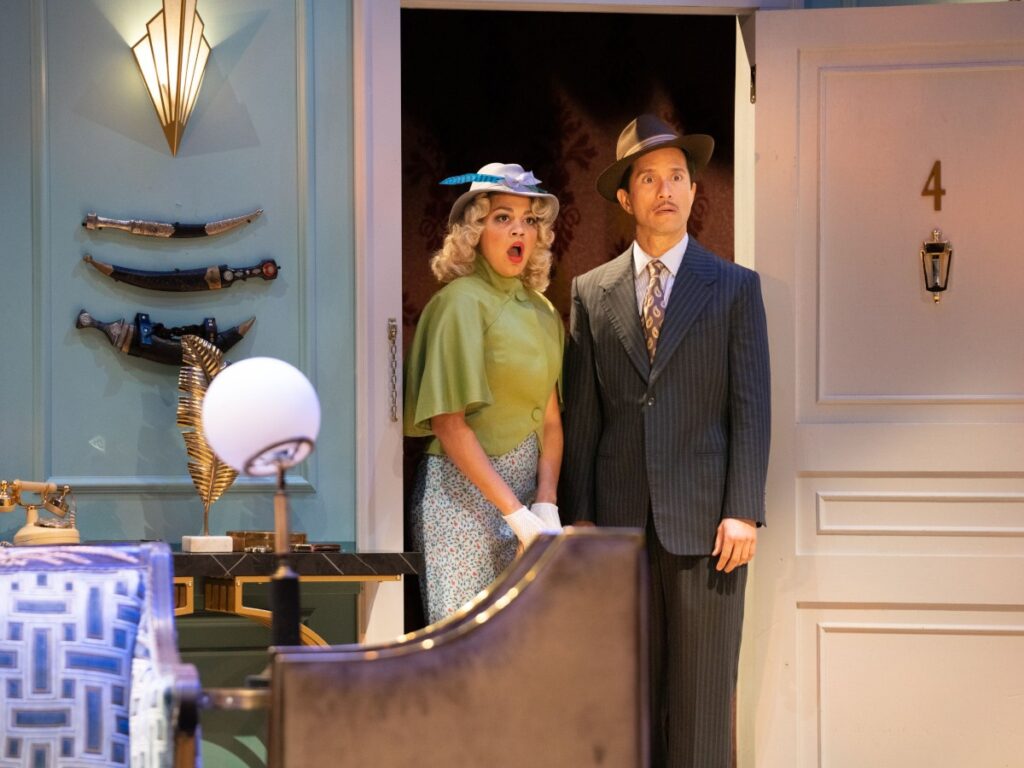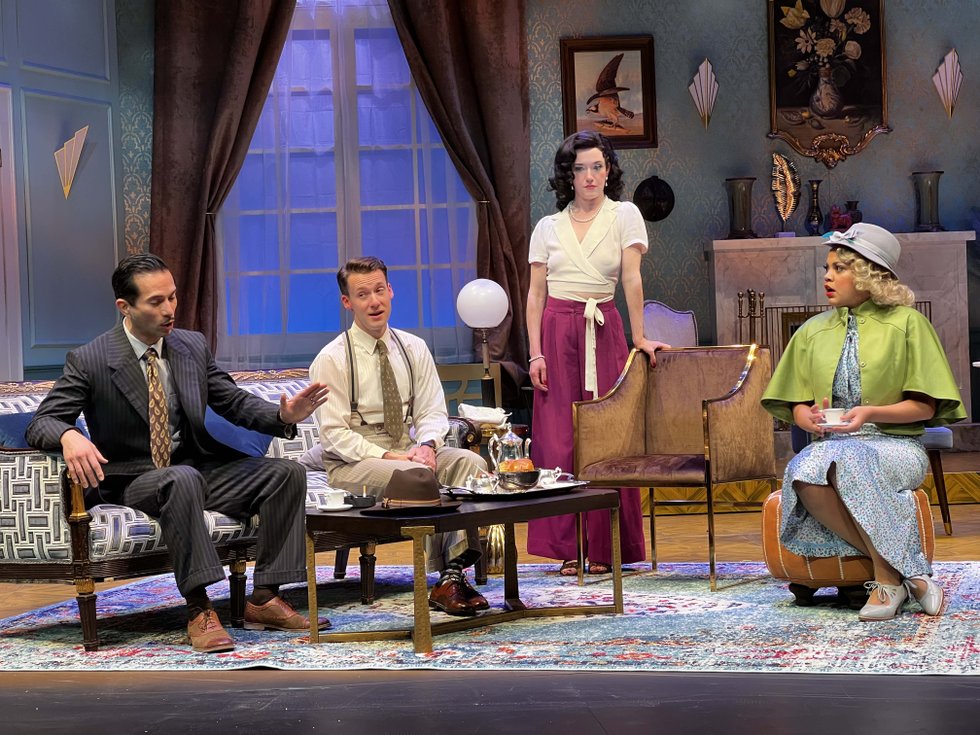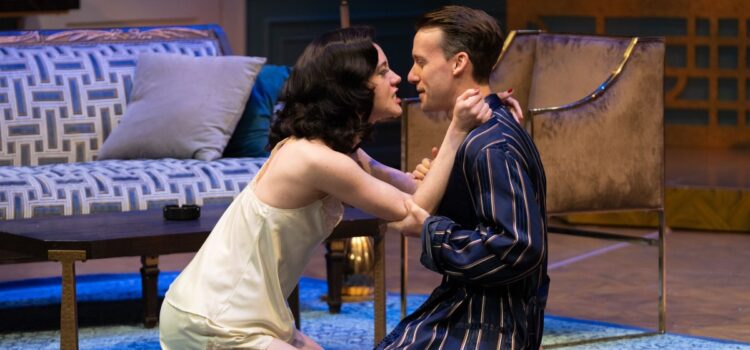By Lynn Venhaus
“You say either and I say either. You say neither and I say neither. Either, either. Neither, neither. Let’s call the whole thing off.” – George and Ira Gershwin
When the Gershwin brothers wrote “Let’s Call the Whole Thing Off” for the 1937 film “Shall We Dance” starring Fred Astaire and Ginger Rogers, gender roles were primarily traditional, as were societal ideals.
The witty ditty is used in The Repertory Theatre of St. Louis’ current show “Private Lives,” exemplifying opposites in Noel Coward’s urbane comedy of manners.
It’s sure indicative of how we can look at things with separate viewpoints. Such is my response to “Private Lives,” which is now playing through Oct. 23 at the Berges Theatre at COCA. The production has been well-received, according to reaction from the audience, my colleagues, and in talking with some theatergoers.
You say silly, I say insufferable.
Once upon a time, this 1930 ‘romantic’ comedy was the height of sophistication and snappy repartee. However, 92 years later, the biting wit has not aged well, despite Coward’s nimble wordplay twisting the battle of the sexes into loggerheads.
The premise of this highly regarded classic is that uppity Amanda Prynne (Amelia Pedlow) and imperious Elyot Chase (Stanton Nash) are enjoying a romantic honeymoon with new spouses, Victor Prynne (Carman Lacivita) and Sibyl Chase (Kerry Warren)– and they just happen to be staying at the same posh hotel on the northern coast of France.
When the divorced duo come face-to-face on adjoining balconies — for the first time in five years — sparks fly. They run off by the end of the first act, but just as passions collide, so do tempers. These two self-important twits remember why they fell in love – and why they split up in the second act.
Does it resonate as a send-up of the British upper-class or has it become a tiresome example of a combustible relationship where two people bicker incessantly? Do people dismiss the violent overtones because it’s a comedy?
“I struck him too. Once I broke four gramophone records over his head. It was very satisfying,” Amanda says to her new husband.
Because the former Mr. and Mrs. Chase bring out the worst in each other, trying to find the best of each other is a chore, not the fizzy fun it purports. (The Rep marketed it as ” fun, laughs, and a fresh take”). I had a tepid and triggering reaction, found it tedious at best and domestic abuse at worst.
In 2022, this work appears to me to be one of the most egregious examples of toxic relationships and white privilege upon examination through a 21st century lens. The melodramatic soap opera quality of this story got very old very fast.
The argument could be made – that was then, this isn’t now. But oh, have you been reading the news?
I don’t find verbal, emotional, or physical abuse of any sort amusing – even if it’s written by a famous closeted gay British snob who had a way with words. It is not OK on any stage, anywhere, and at any time. Period.

Let’s just refrain from giving any past-its-prime material attention if it involves unacceptable behavior that would not fly today (unless it’s a cautionary tale).
Sure, it remains one of Coward’s most celebrated successes and has been revived several times, but what is the reason for doing this show now or ever after?
Many people laughed – loud guffaws — on opening night Oct. 7 as the angry couple hurled food and broke things while slapping each other around. Fight choreographer Nathan Keepers had much work to do.
I was in a minority of those not chuckling. We were a smattering. In my lifetime, I’ll never understand why audience members were laughing at physical confrontations and destruction of property not their own. OK, people still laugh at The Three Stooges punching and poking each other, and there are Roadrunner and Wile E Coyote cartoons as points of reference.
Anyone thinking that the more acceptable we make of couples battering each other, the harder it is for abuse victims to come forward? Ever see the real physical aftermath or consequences? I doubt if anyone who grew up in an abusive household or is a survivor/victim of domestic abuse would find anything about this show ‘funny ha-ha’.
OK, the luxe set, designed by Lex Liang, was lovely to look at with its stylized Art Deco interiors, though. And expertly lit by lighting designer Colin Bills. The production elements excel in recreating the era’s affluence, including Kathleen Geldard’s glamorous costumes.
Yes, the production is slick and the performers skillful, but are two narcissists hell-bent on getting their way, no matter what cost, fun to watch? A darker truth is apparent on stage, no matter how many quips are delivered.
Amanda: I was brought up to believe it was beyond the pale for a man to strike a woman.
Elyot: A very poor tradition. Certain women should be struck regularly, like gongs.
Now, there were some gasps on that exchange.
Perhaps chemistry figures in to accepting that this once red-hot pair continue to emit white heat when together. Obviously, they can’t live together, for they start acting like ill-tempered children.
And they know it.
Amanda: I think very few people are completely normal really, deep down in their private lives. It all depends on a combination of circumstances. If all the various cosmic thingummys fuse at the same moment, and the right spark is struck, there’s no knowing what one mightn’t do. That was the trouble with Elyot and me, we were like two violent acids bubbling about in a nasty little matrimonial bottle.
In the program, dramaturg Arianne Johnson Quinn, the inaugural Noel Coward fellow in the Billy Rose Theater division at the New York Public Library for the Performing Arts, quotes Coward scholar: “Beneath the sophisticated repartee are two accidental assassins – destined to be destructive of each other and of anyone who comes emotionally close to them (The Letters of Noel Coward, 217).”
Quinn then wrote: “For Coward, affairs of the heart are glamorous excursions into human nature, and the inevitable comedy that follows stems from his ability to create living, breathing characters rather than dramatic archetypes. At the same time, modern audiences cannot escape the undercurrent of domestic abuse that runs as a throughline in the play.”
No, we can’t escape it – especially when they discuss their previous rows:
Elyot: The worst one was in Cannes when your curling irons burnt a hole in my new dressing-gown. [He laughs.]
Amanda: It burnt my comb too, and all the towels in the bathroom.
Elyot: That was a rouser, wasn’t it?
Amanda: That was the first time you ever hit me.
Elyot: I didn’t hit you very hard.
Amanda: The manager came in and found us rolling on the floor, biting and scratching like panthers. Oh dear, oh dear…[She laughs helplessly.]
Certain insensitive stereotypes, words, phrases, and behaviors have fallen out of favor in the name of diversity and inclusion, yet these golden-age chestnuts portray men keeping women in line like they’re property. And seem so cavalier about abuse.
Amanda: You are an unmitigated cad and a bully!
Elyot: And you are an ill-mannered and bad-tempered slattern!
Amanda: Slattern indeed!
Elyot: Yes, slattern and fishwife!
(Fishwife, according to the Macmillan Dictionary, is a slur for “a woman who speaks loudly in a rude voice.”)
Amanda bucks conformity, but her ‘feisty’ nature isn’t an excuse. When she’s confronted by her husband, finally, in her Paris flat, after a huge fight with Elyot, this is an exchange:
Victor: Did he really strike you last night?
Amanda: Repeatedly, I’m bruised beyond recognition.
Making light of a knock-down, drag-out?
Taking a second look at very sexist books in creaky musicals, critics have decried “blackface,” “brownface,” “redface” and “yellowface.” Shouldn’t behaving badly on stage get an adverse reaction too?
You say funny, I say not. You say flippant, I say superficial exercise involving rich gasbags without much substance. You say erudite, I say entitled, pouty, shallow females and self-absorbed condescending males.
The new mates are obsessed with knowing how they rate compared to the wretched former wife or husband – this seems to be interminable interaction.
Coward wrote the play so that he and his actress friend, Gertrude Lawrence, could portray the characters, and he modeled the self-centered Amanda on his histrionic diva pal. Supposedly, their tumultuous friendship was not unlike the roles.
Amanda is an unlikable sharp-tongued, prone to exaggeration and temperamental shrew. She’s a spoiled insipid woman who behaves badly in the name of love. Pedlow’s affected – and hard to decipher sometimes – speech gets in the way. Dialect Coach Jill Walmsley Zager’s work was incomplete.
Stanton Nash, so delightful in St. Louis Shakespeare Festival’s “Much Ado About Nothing” this past summer, has crisp comic timing and lets the fast-paced insults fly. But his character is a pompous ass.
As the jilted partners, Lacivita was debonair and a bit starchy as Victor, a colorless role, and Warren, unfortunately, is shrill in the stereotypical Sibyl role, an attractive but rather uninteresting and somewhat bubbleheaded bride prone to shrieking. As ‘the other two,’ they are stuck in very cookie-cutter parts.
Yvonne Woods has a brief role as Amanda’s French maid Louise, tasked with cleaning up the messes.
The focus, naturally, is on Amanda and Elyot, for they burn bright no matter what the temperature of the room. These would be unlikeable characters in any decade.
Sure, the characters are in a higher income bracket than some who live with domestic violence, but it’s still unhealthy, no matter how cultured the speech pattern or what class ranking they are. (Nicole Brown Simpson, anyone?)
I am reminded of F. Scott Fitzgerald’s description of Tom and Daisy Buchanan in “The Great Gatsby”:
“They were careless people, Tom and Daisy – they smashed up things and creatures and then retreated back into their money or their vast carelessness, or whatever it was that kept them together, and let other people clean up the mess they had made.”
Fitzgerald viewed them as a tragedy, Coward considers his vain high society characters a comedy.

If this was a modern play, the entitlement and mistreatment would have everyone outraged, but here, we should accept it because it has the warm glow of nostalgia and it is written by a theater legend?
The Rep producers and director Meredith McDonough obviously think this madcap romp is entertaining, like the good old screwball comedies that run on Turner Classic Movies these days. (For the record, I wanted to be Rosalind Russell in “His Girl Friday.”)
McDonough described the show as a “loving treatise on love” — and then directed it like an irritating high-class shouting match ramped up in volume. Hana S. Sharif, the Augustin Family artistic director, called it a “great escape.”
The tone-deafness is mind-boggling. In what language, country, time or universe is this second act fight funny after Amanda puts on a record that Elyot doesn’t want to listen to?
Elyot: Turn it off.
Amanda: I won’t. [Elyot rushes at the gramophone. Amanda tries to ward him off. They struggle silently for a moment, then the needle screeches across the record] There now, you’ve ruined the record.
[She takes it off and scrutinizes it.]
Elyot: Good job, too.
Amanda: Disagreeable pig.
Elyot [suddenly stricken with remorse]: Amanda darling, Sollocks.
Amanda [furiously]: Sollocks yourself.
[She breaks the record over his head.]
Elyot [staggering]: You spiteful little beast.
[He slaps her face. She screams loudly and hurls herself sobbing with rage on to the sofa, with her face buried in the cushions.]
Amanda: [wailing]: Oh, oh, oh-
Elyot: I’m sorry, I didn’t mean it — I’m sorry, darling, I swear I didn’t mean it.
Amanda: Go away, go away, I hate you.
[Elyot kneels on the sofa and tries to pull her round to look at him.]
Elyot: Amanda — listen — listen —
Amanda [turning suddenly, and fetching him a welt across the face]:
Listen indeed; I’m sick and tired of listening to you, you damned sadistic bully.
Elyot with great grandeur]: Thank you. [He stalks towards the door, in stately silence.
Amanda throws a cushion at him, which misses him and knocks down a lamp and a vase on the side table.
Elyot laughs falsely] A pretty display I must say.
Amanda [wildly]: Stop laughing like that.
Elyot [continuing]: Very amusing indeed.
Amanda [losing control]: Stop–stop–stop– [She rushes at him, he grabs her hands and they sway about the room, until he manages to twist her round by the arms so that she faces him, closely, quivering with fury]—I hate you–do you hear? You’re conceited, and overbearing, and utterly impossible!
Elyot [shouting her down]: You’re a vile-tempered, loose-living; wicked little beast, and I never want to see you again so long as I live.
[He flings her away from him, she staggers, and falls against a chair. They stand gasping at one another in silence for a moment.]
Amanda [very quietly]: This is the end, do you understand? The end, finally and forever.
[She goes to the door, which opens on to the landing, and wrenches it open. He rushes after her and clutches her wrist.]
Elyot: You’re not going like this.
Amanda: Oh, yes I am.
Elyot: You’re not.
Amanda: I am; let go of me–[He pulls her away from the door, and once more they struggle. This time a standard lamp crashes to the ground. Amanda, breathlessly, as they fight] You’re a cruel fiend, and I hate and loathe you; thank God I’ve realized in time what you’re really like; marry you again, never, never, never… I’d rather die in torment
Elyot: [at the same time]; Shut up; shut up. I wouldn’t marry you again if you came crawling to me on your bended knees, you’re a mean, evil- minded, little vampire — I hope to God I never set eyes on you again as long as I live.
[At this point in the proceedings they trip over a Victor and Sybil enter quietly, through the open door, and stand staring at them in horror. Finally Amanda breaks free and half gets up, Elyot grabs her leg, and she falls against a table, knocking it completely over.]
Amanda [screaming]: Beast; brute; swine; cad; beast; beast; brute; devil
[She rushes back at Elyot who is just rising to his feet, and gives him a stinging blow, which knocks him over again. She rushes blindly off Left, and slams the door, at the same moment that he jumps up and rushes off Right, also slamming the door.
Victor and Sibyl advance apprehensively into the room, and sink on to the sofa]
In the third act, Sibyl and Victor begin mirroring the battling ex’s.
The Rep has very mixed messages in their line-ups.
Certainly, “Private Lives” is devoid of any teachable moment or enlightenment – or even making a connection.
I say potato, you say ‘po-tah-to.’ You say classic, I say painful. You say lighten up, I say, let’s talk. Know more, support services, be the change: 1 in 4 women and 1 in 7 men are affected, and 1 in 15 children witness domestic abuse.

The Repertory Theatre of St. Louis presents “Private Lives” Sept. 30–October 23, in the Catherine B. Berges Theatre at COCA (Creative Center of the Arts), 6880 Washington Avenue, St. Louis, 63130. For tickets or more information, visit: www.repstl.org.
For more information, the National Domestic Abuse Hotline, visit: https://www.thehotline.org/
To support local services, check out:
Safe Connections, 2165 Hampton Ave., St. Louis, 63139; email [email protected], call 314-646-7500, visit https://safeconnections.org/. They have a 24-hour crisis helpline: 314-531-2003
Violence Prevention Center of Southwestern Illinois, 618-236-2531, visit: https://www.vpcswi.org/. They have a 24-hour crisis helpline: 618-235-0892

Lynn (Zipfel) Venhaus has had a continuous byline in St. Louis metro region publications since 1978. She writes features and news for Belleville News-Democrat and contributes to St. Louis magazine and other publications.
She is a Rotten Tomatoes-approved film critic, currently reviews films for Webster-Kirkwood Times and KTRS Radio, covers entertainment for PopLifeSTL.com and co-hosts podcast PopLifeSTL.com…Presents.
She is a member of Critics Choice Association, where she serves on the women’s and marketing committees; Alliance of Women Film Journalists; and on the board of the St. Louis Film Critics Association. She is a founding and board member of the St. Louis Theater Circle.
She is retired from teaching journalism/media as an adjunct college instructor.



